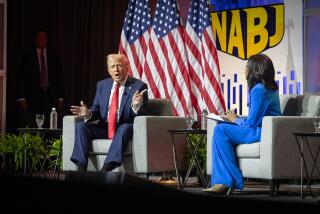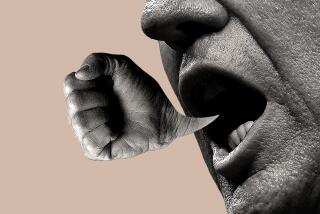At Riots’ Wake, Clinton Seeks to Exploit Race Issue
- Share via
WASHINGTON — Who said the following?
“(Democrats have) suffocated discussion of self-destructive behavior . . . in a cloak of silence and denial.”
“(We cannot) make race an excuse for failing to pass judgment about self-destructive behavior.”
“We cannot deride as politically incorrect the anger of taxpayers who work hard to support their families and then find themselves supporting generations of welfare families as well.”
“(Fear of violent young black males) covers the streets like a sheet of ice.”
“(Crime is) the most deadly poison there is to improved relations between black and white Americans.”
“(We need) the simple restoration of order.”
If you guessed President George Bush, White House Press Secretary Marlin Fitzwater, Patrick J. Buchanan or even David Duke--you’re wrong.
These statements come from two separate speeches by Sens. Bill Bradley (D-N.J.) and John Kerry (D-Mass.), delivered only a few weeks before the Los Angeles riots. Both men were praised in the media as bold advocates of a new awareness that old anti-poverty strategies are failures.
By contrast, Bill Clinton has been cravenly political since the first flames were fanned in Los Angeles. Instead of straight talk, Clinton has given us a textbook illustration of why they call him “Slick Willie.”
Here’s a brief chronology of how Clinton has tried to convert our national tragedy into political gain:
At the height of the rioting, Clinton dispatched his political advance teams to try to stage a media event straight out of Robert F. Kennedy’s 1968 campaign. During the ’68 riots, Kennedy delivered an impassioned and statesmanlike speech to soothe a crowd gathering on an Indianapolis basketball court. Clinton’s consultants thought they saw the same opportunity in the Los Angeles riot, so they tried to arrange a trip to the same basketball court--accompanied by sons of Kennedy and Martin Luther King Jr. But logistical difficulties aborted the stunt.
Even while the President was planning a meeting with the nation’s civil-rights leaders and Atty. Gen. William P. Barr to discuss taking prompt federal action in the Rodney G. King case, Clinton was criticizing Bush for not trying to heal racial wounds and urging the Justice Department to bring charges against the four accused Los Angeles policemen.
Did Clinton think the President’s meeting wasn’t an effort to reach out? Did he think the Justice probe would be abandoned?
No. Clinton didn’t act out of any conviction. He acted on the imperative to make it into each day’s news cycle, no matter how cheap his shots at the President or how cynical his efforts at media manipulation.
When the Administration had the audacity to suggest what Bradley and Kerry have been saying--that the liberal programs of the ‘60s and ‘70s failed to stop conflagrations like the 1965 Watts riot from recurring--Clinton pounced again. He now claims that not enough money has been put into the cities.
Where has he been? For more than a decade, Republicans like Jack F. Kemp, President Ronald Reagan and Bush have been pushing for the creation of urban enterprise zones to attract investment into the cities. Republicans have been pushing tenant-ownership of public housing. It’s been Republicans who have pushed for more local control over welfare programs so grass-roots programs that work can get needed funding. Who’s been blocking grass-roots empowerment? The Democratic Congress, that’s who.
If Clinton wants to look like Bobby Kennedy, he can begin by acting like him. The first lesson--one Kennedy learned when he was still attorney general--is that you can’t please all the people all the time. Clinton’s problem--evident in his muted tour of the riot corridor in Los Angeles--is that he doesn’t understand the basics of political leadership. What seems like a search for consensus and the middle ground masks something worse: Slick Willie lacks basic convictions.
Clinton’s been paralyzed in a political no-man’s land. He badly wants to exploit racial tension and turn it into a referendum on Bush’s leadership. But he’s afraid of coming off like a bleeding-heart liberal and alienating blue-collar voters. And he can’t resist taking political potshots at Bush during a moment of crisis. So he couches his criticism in soothing rhetoric about national healing. Yet it can’t conceal Clinton’s hypocrisy and political opportunism.
If Clinton had any courage or fresh ideas, he might take a cue from Bradley and Kerry. A return to the failed liberal orthodoxy of the past isn’t going to erase urban blight. Pandering to that orthodoxy to make the next news cycle may look like smart politics--but it’s poor policy. Clinton’s early promise on the campaign trail was that he offered more policy than politics. His performance in the aftermath of the riots has shown just how bankrupt his candidacy has become.
More to Read
Get the L.A. Times Politics newsletter
Deeply reported insights into legislation, politics and policy from Sacramento, Washington and beyond. In your inbox twice per week.
You may occasionally receive promotional content from the Los Angeles Times.










